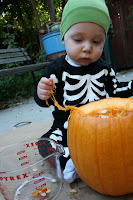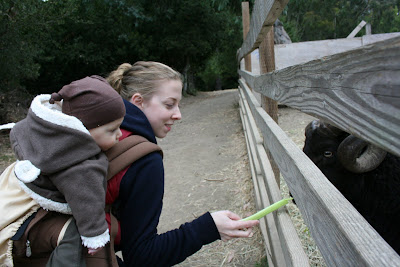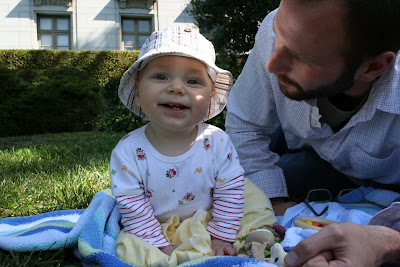Hi All,
Hendrick asked me to make this posting for him...
"It was a normal enough afternoon. Warm and sunny, like most days in the world. My friends Eleanor and Amy had already collected their parents and gone home for the day. I did what I do most days at that time. I had my teacher plant me squarely on my bottom—a firm base on which to bob, weave, smile, bob, weave, smile.
My fried Ivan was crawling about me with ferocious speed and energy. He is quite the mobile baby, if you haven’t seen him. An impressive sight. We all have our talents. Ivan moves. I eat and drink. I do have five teeth now—the most of any baby at my school. What can I say, it’s my gift. Of course, as with any gift, I well know that it my responsibility to develop and hone it. And I do. I make a point, three times a day, to have the tall people around me seat me at a small table, where I communicate with articulate noises, as well as careful body language (there are multiple forms of communication, you know), that I am ready for my feeding. I gesture to pureed apples, glance at peas and sweet potatoes, sometimes call out to banana rice pudding, and they each come to me, in turn. It is wonderful to be so powerful, so independent. And these are just the solid foods I work with. I also am quite able when it comes to liquids. As we all know, there are two in existence. First, there is that sweet, white, creamy liquid, often called “milk” by the tall ones. Whatever you call it, it is simply delicious. It is produced in two ways, one far preferable to the other, but both fully serviceable: my mama and my bottle. The second liquid is clear and less viscous, but perhaps best described as what it is not, i.e., milk, than what it is. It more or less the anti-milk, if you will—though I have never heard it called that. Again the tall people have their own way: they call it “water.” It is mainly used to cleanse my palate between solid foods—something I appreciate. There is a time for mixed foods, to be sure, but who can dispute that sweet unadulterated fruits, roots, and vegetables are best. But I digress. The long and short of it is that I am quite capable when it comes to eating and do so with a sophisticated palate.
So there I was, sitting on a mat, Ivan sprinting about me. I think I was working on my gross and fine motor skills, perhaps with ball, perhaps a bell. Perhaps it was a wooden ring or fish. No matter. Whatever I was doing, suddenly, but predictably, daddy arrived, tall, lanky, hairy, boxy glasses propped on nose (his most distinguishing feature), atop his head a baseball cap (perhaps his transitional object, mine being a burp cloth—again we all have our preferences). My afternoon teacher asked me what she always asks upon his arrival: “Quien es?” (“Who is it?”) I gently reminded her.
At any rate, I locked eyes with daddy. Never underestimate the power of the gaze. Some ancients used to think that to cast your eyes upon something was akin to actually, physically touching it—an explanation perhaps largely dispensed with today, but one that nevertheless seems true at some level of human experience.
I then pulled him in. He shuffled my way, smiled, said, “Hey baby,” and then bent down to my level. He kindly acknowledged Ivan and my teacher—something I approve of, as long as it doesn’t drag on for too long. Finally, he placed his hands under my arms and I experienced a rapid liftoff from the ground. Always a rush—particularly this time since the acceleration was more rapid, followed by a momentary release from daddy’s hands and a brief moment of infantile freefall. Exhilarating; I recommend it.
What immediately followed was, once more, quite predictable—and pleasingly so; we babies have a very strong sense of order. Daddy checked the clipboard to review my daily accomplishments: good disposition, play with balls and mirror, 4oz morning bottle + lunch of pear and butternut squash + 5oz afternoon bottle, and 15min nap + 15min nap + 1.5hr nap. As often, he particularly scrutinized my diaper report card. A slight smile and nod revealed his pleasure, perhaps even relief, with the results: four straight W’s and one solid BM. Next he made a bee-line for the changing table. He laid me on it, took off my diaper, made a fart noise on my belly (something he calls a “raspberry”), lathered me in a substance he says I’ll enjoy more later in life (whatever that means), and wrapped me up in a warm dry diaper and pair of pants. Then he gathered up all my many non-plastic food containers (“a must,” he tells me, “in Berkeley”) and raced me out the door to our mode of transportation: one of those old, large, blue, self-moving strollers called a “Ford F-150.” For babies unfamiliar with this model stroller, it is just slightly larger than the popular Bugaboo Cameleon. Daddy strapped me in, the stroller roared to life, and he began to sing the first of several songs. The sun burning my face and eyes, I had daddy pull down my canopy, and I resigned myself to the experience.
Fastforward to home—where we diverge from the normal. To be sure, at first things seemed perfectly fine. We came in our door, and daddy put me down, while he moved in and out of the room with various objects, a bag, toys, blanket, etc. This game I sometimes find entertaining, but mostly not. Then I noticed that he was in the kitchen a little longer than normal—bizarre. I sensed danger and immediately called out. He entered the room and relief washed over me, followed by pure joy. Daddy had a bottle! Where he found one at this time of day, not long before mama would come home, is totally unknown. As we all know, bottles generally do not produce milk in the late afternoon. But the fact is he had it. I brought him in with my gaze. He picked me up. I directed him to the rocking chair in my room. He obeyed. We sat. I raised my hands, grasped the bottle, and lined up the nipple for precise insertion in my mouth. Three, two, one, contact! (A polymath baby like myself can count.) I sucked and prepared myself for the sweet release of milk, only to discover that milk there was not. My discriminating taste revealed the unmistakable and unimaginable: it was the anti-milk! I paused, frowned, and then took out the bottle. Sure enough, it was clear, not viscous. I shook it in my hand to watch the fluid in action to make sure. I was correct. I then put it back in my mouth—surely my first experience with what the tall call “denial.” It was still the anti-milk. I took it out again. Admittedly, I was perplexed, but who wouldn’t be in my situation. Just then I noticed daddy smiling—and it hit me. I had had my first joke bottle. Many babies (like two or three) had told me about the existence of such bottles—bottles that should produce milk, but instead perversely produce something else, in this case the anti-milk. I doubted their existence. But lo and behold, here one was, in the safety and predictability of my own home. I took a deep breath and did what I always do in these situations: I used daddy as an emotional tool. He found it funny. So then would I. I smiled. But in case it would help to avoid the joke bottle again, I threw it on the ground. A single experience with a joke bottle can be enjoyed, but multiple ones I simply cannot tolerate.
Subsequent events rounded out the learning experience. Daddy next took me over to my table, sat me down, and tried to give me something slightly more normal, at least under the proper circumstances: anti-milk in a cup. But I refused outright and threw the cup on the table. Perhaps the joke bottle was not daddy’s fault. Surely he was initially unaware of the whole thing—an ignorant vessel of unknown evil. But to offer me anti-milk so soon after my experience with the joke bottle was too much. Perhaps it added insult to injury. In the end, while I realized the extreme vicissitudes of fortune in life, daddy came to a truth of equal importance. Babies have principle, too.
Nota Bene: I have changed all names to protect the identities of my baby friends."
 H's December workouts focused on lots of squats, pull-ups, bicep curls, and some light weight lifting. He has become quiet adept at these various exercises after spending endless amounts of time perfecting each motion.
H's December workouts focused on lots of squats, pull-ups, bicep curls, and some light weight lifting. He has become quiet adept at these various exercises after spending endless amounts of time perfecting each motion.

















































